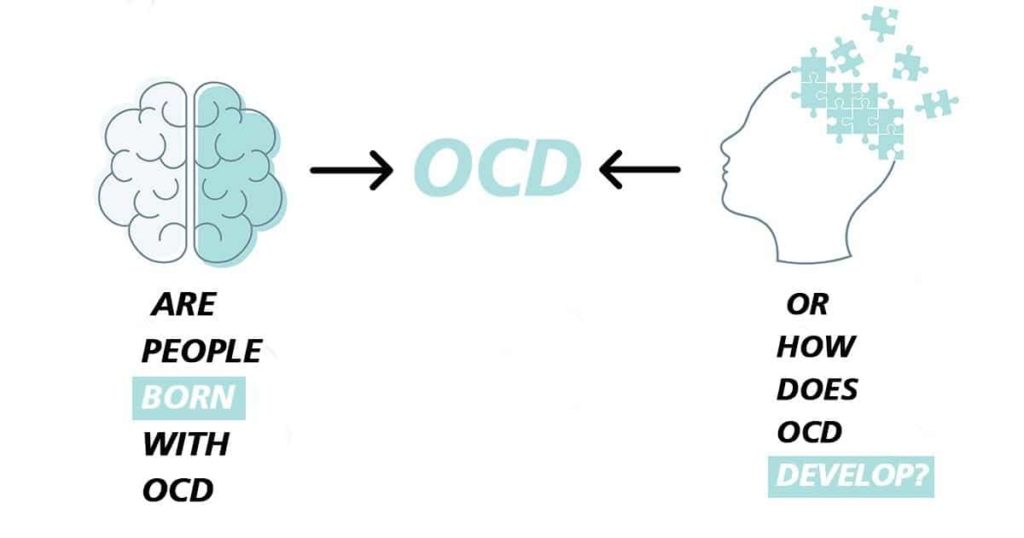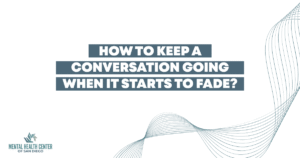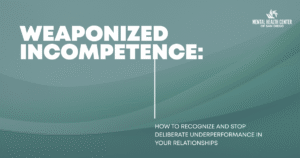Are you born with OCD? As is the case with most mental health disorders, the answer is more complex than a simple “yes” or “no.” However, effective treatments are available to improve your quality of life either way.
Obsessive-compulsive disorder or OCD leads to unwanted, recurring thoughts or obsessions. You may then feel an urge to do things repetitively as a result of those obsessions. The repetitive behaviors are compulsions.
Understanding Obsessive-Compulsive Disorder
You can have distressing thoughts or repetitive behaviors and not have OCD or any other type of anxiety disorders. The distinction with OCD is usually that your thoughts and behaviors cause significant disruption to your daily life. Your thoughts are persistent. Your behaviors are rigid in that if you don’t do them, it can be very distressing for you.
Some OCD patients know that their obsessions are unrealistic, while others don’t.
Even if you realize what you’re doing isn’t rooted in reality, you may not be able to stop your obsessive thoughts or compulsive behaviors, at least not without professional treatment.
For an OCD diagnosis and treatment, some obsessions and compulsions take up more than one hour a day, impair your functionality at work, school, or socially, and cause you distress. An estimated 2% to 3% of people in the U.S. are affected by OCD, with women being slightly more represented than men. You can find more about some unusual symptoms of OCD here.
The symptoms may appear in childhood or adolescence, or early adulthood and the average age of onset is 19.
What Are Obsessions?
A recurrent and persistent thought or impulse, obsessions cause you to feel distressing emotions. These emotions might include disgust or anxiety. You may recognize that these thoughts are unreasonable, but they’re intrusive, and you can’t stop them by trying to reason with yourself or use logic. If you have OCD, you might use compulsions as a way to try and relieve some of the distress you feel.
Common obsessions include:
- Unwanted or disturbing sexual thoughts or images
- Fear of blurting out something offense
- Concern for symmetry or order
- Worry of contamination
- Ongoing intrusive thoughts with words, images, sounds, or numbers
- Anxiety about losing something or throwing it away
Mental Health Center of San Diego
What Are Compulsions?
A compulsion is either a repetitive behavior or mental action. People with OCD, might feel driven to do these compulsive behaviors in response to their obsessions. Their goal might be to reduce the distress in brain functioning they feel because of the obsession.
The actions can also be entirely unrelated to the particular obsession, but they still alleviate distress.
Common compulsions include:
- Counting to a certain number
- Always seeking reassurance
- Arranging things in a certain way
- Constantly checking switches or locks
- Excessive showering or handwashing
- Repeated cleaning of objects

Types of OCD
There are different ways that OCD can be categorized, including:
- Checking: With this type, a person might feel like they need to repeatedly check for problems like a fire or maybe that a door is locked. They could also constantly check back over emails or texts to make sure they didn’t have any mistakes in their communication.
- Contamination fears: This type of obsessive-compulsive disorder is most often portrayed in television and movies. The symptoms might include an overwhelming, ongoing need to clean oneself or something else. Excessive handwashing or repeatedly cleaning part of a room can be symptoms of this. Some people with this type of OCD will also avoid crowds because of a fear of germs or sickness.
- Hoarding: In this situation, a person will gather useless or valueless items, and they cannot force themselves to throw them away.
- Intrusive thoughts can be harmful because they might lead someone to suicidal behaviors, or they could have intrusive thoughts about hurting someone else. Luckily, it’s rare that someone with this type of OCD acts on the ideas.
- Orderliness: This is another type of OCD often portrayed in pop culture, where someone feels like they have to arrange or order things in a certain way.
What Causes OCD?
To go back to the original question of are you born with OCD, the short answer is that we don’t always know. There are theories, and doctors do believe there’s a genetic component involved. However, the National Institute of Mental Health haven’t found one particular gene in children and adolescents that’s linked to the sudden onset of OCD.
The first signs of this mental health disorder typically appear in adolescence but can become apparent in children. With this disorder in children, it can lead to complications like:
- Difficulties forming relationships
- Low self-esteem
- Problems completing schoolwork
- Physical illness
- Extreme stress
When this mental illness appears in childhood, it’s more common in males than females. By adulthood, males and females are almost equally affected. Some of the causes that could contribute to obsessive-compulsive disorder include:
Mental Health Center of San Diego
Genetic Factors
The genetic component leads some professionals to say yes. There do seem to be indications that this mental health disorder runs in families. This link is something researchers are looking at closely now.
Imaging studies have so far shown that the brains of people who have obsessions and compulsions have differences. Some genes affect how your brain responds to dopamine and serotonin, which may also play a role.
Environmental Factors
Most mental disorders are the result of a combination of risk factors which can include environmental risk factors. For example, if you have a genetic disposition to a specific psychiatric disorder, stressful life events can trigger it or make it worse.
Some people first notice signs of mental health conditions after a significant life event, like a severe illness. Periods of intense stress or a traumatic event can trigger the symptoms of OCD, especially if you do have that genetic predisposition.
Cognitive Problems
A person with an obsessive-compulsive disorder might misinterpret what they’re thinking. Most people have thoughts that we would consider intrusive or not welcome for time-to-time. If you have OCD, these thoughts become more relevant in your life and disrupt your functioning.
Mental Health Center of San Diego
Treatment for OCD
While OCD can develop at an early age, and you may be born with it, that doesn’t mean treatment isn’t available.
Psychotherapy is an excellent treatment option. In particular, cognitive-behavioral therapy or CBT is helpful. When you work with a therapist and utilize CBT, you can change how you think, feel, and ultimately behave.
For obsessive and compulsive disorders, a therapist might use exposure and response prevention or ERP along with cognitive therapy. ERP involves exposure to the situations that trigger your anxiety or distress. Then, with habituation, repeated exposure can help reduce the discomfort you feel in these situations. The response part of this type of therapy can teach you to stop doing compulsive behaviors.
With CBT, you learn how to identify your negative beliefs and change them so that you can stop engaging in compulsive behavior.

In some cases, your treatment provider might also advise that you take medication in addition to therapy. For example, selective serotonin reuptake inhibitors or SSRIs, a type of antidepressant, could help you. If you don’t respond to SSRIs, your treatment provider might prescribe antipsychotic medication.
Your symptoms can improve, especially with professional treatment from the clinical team at The Mental Health Center of San Diego. If you don’t get proper treatment, your OCD symptoms can get worse. We encourage you to contact us by calling (858) 258-9883 to learn more about the appropriate treatments for your particular situation.









